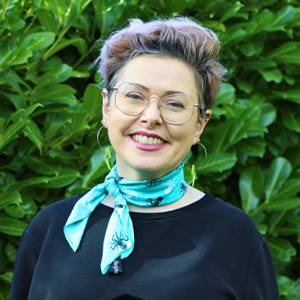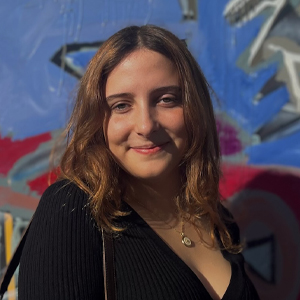
Futureproof yourself
How can you make yourself indispensable to future employers in an agile, evolving labour market? We ask an expert for her advice and talk to a recent grad who has used these tips to boost her own career.

UofG Careers and Employability Manager Ann Duff (right) would like to share her wisdom. Ann has been a careers advisor for over 20 years and has worked at UofG since 2001. “My career here has been inspiring, challenging and ever-changing,” she says. “I have literally seen thousands of students and hope that in some small way I have been a positive change agent in their career journeys.”
Bérénice Berlan (below, MA 2023) has taken Ann’s advice while treading her own career path. Bérénice studied History of Art and Film Studies at UofG and while here, did three internships in different sectors of the University. Bérénice has taken a year out to upskill and explore some of her hobbies – including learning how to produce her own music! She is beginning a Masters in Curation and Criticism in the Arts, in Toronto, for next year and would ideally like to be a museum curator.
 Keep developing your skills
Keep developing your skills
ANN: Stay competitive in an ever-evolving job market by embracing a learning agility mindset. Commit to upskilling and reskilling to align with industry trends – if you haven't already, consider joining a professional association or society. Attend workshops, webinars and conferences and consider additional professional qualifications, if relevant, or micro-credentials – short-term learning experiences or professional development. Embrace a growth mindset, recognising that learning is an ongoing process that enhances your professional value.
BERENICE: I've learned a lot of practical skills by myself, and they’ve always helped me get the next job. I learned the basics of graphic design through things like YouTube, LinkedIn Learning and the Adobe crash courses they have for free on their website. This got me designing for University societies and magazines, and then my last internship was a website design one. I was the graphic designer for GUEST (Glasgow University Environment and Sustainability Team) for a year, and that pushed me to research brand identity, marketing and events training as well. It was about making the most of everything I was involved in, so that I would have a bigger portfolio – and it worked.
I’m trying to open as many doors for myself as I can.
Curate and leverage your network
ANN: Cultivate and maintain a strong professional network. This is a powerful tool for career growth, providing access to valuable insights, job opportunities and mentorship. Networking, building a professional community and reaching out to people you admire is all part of a career development strategy we call 'planned happenstance' – 'planned' because you are taking meaningful action, and 'happenstance' because you don’t know how it will all turn out. Attend alumni events, industry conferences, and use online networking platforms like LinkedIn or The Dots, if you are in a creative role, to connect with professionals in your field. Proactively engage in conversations, share your expertise, and seek opportunities to collaborate. A robust professional community can be a key factor in advancing your career.
BERENICE: Through university, I’ve met a lot of different people in different fields. I did a programme at the Glasgow Film Festival that focused on networking, and that has been very useful, because I’m still in contact with the festival director. Sometimes it can be a bit humbling, because you have to go in there and message people, remind them that you exist and that you are looking for the opportunities that they might have. But I think LinkedIn is great for that – I’m always commenting and reacting on my mentors’ posts.
It’s about keeping a connection and updating people on what I’m doing, and it’s worked out perfectly as I got great references for my Masters.
Lean into adaptability and resilience
ANN: The Institute of Student Employers have been talking a lot with their employer members about embracing ambiguity and being comfortable with being uncomfortable. In today's dynamic work environment, adaptability and resilience are essential. Be open to change, willingly take on new challenges and demonstrate flexibility in your career path. Embrace failures as learning opportunities and develop resilience to navigate setbacks. The ability to adapt to change and bounce back from setbacks not only enhances your professional agility, but also makes you a valuable asset in any work setting.
BERENICE: When I’m about to do an interview, I always think of where I might have messed up in the one before and focus on not messing those things up again! It’s been a humbling experience – I think there’s a lot of that in the creative industries – but it’s also a lot of work and determination, and I always ask for feedback. At some point, something will work.
Interviews can be scary, but they can also teach you so much. Any rejection, for me, is a reason to improve.
ANN: Remember, this advice is applicable across various industries and career stages, but if you are two years out of university you can still connect with Careers, Employability and Opportunity through masterclasses and the webpages for graduates are open to all our alumni community.
This article was first published April 2024.
Discover more
Careers, Employability & Opportunity
Berenice Berlan
Image of Ann Duff: Hannah Vuozzo
Image of Bérénice: courtesy of Bérénice Berlan
UofG students have high employability rates, with 94% of our graduates in work or further study 15 months from graduation. – Graduate Outcomes Survey Data
Putting it into practice
 Bérénice Berlan (MA 2023) has taken Ann’s advice while treading her own career path. Bérénice studied History of Art and Film Studies at UofG and while here, did three internships in different sectors of the University.
Bérénice Berlan (MA 2023) has taken Ann’s advice while treading her own career path. Bérénice studied History of Art and Film Studies at UofG and while here, did three internships in different sectors of the University.
- Upskilling
“A lot of practical skills I've learned myself, and they’ve always helped me get the next job. It started when I studied graphic design by myself, learning the tools through things like YouTube, LinkedIn
Learning and the Adobe crash courses they have for free on their website; reading articles and just practising in my free time. It got me designing for University societies and magazines, and then my last internship was a website design one. I was the graphic designer for GUEST (Glasgow University Environment and Sustainability Team) for a year, and that pushed me to research brand identity, marketing and events training as well.
It was about making the most of everything I was involved in and trying to get as much from those opportunities as possible, so that I would have a bigger portfolio – and it worked. I’m trying to open as many doors for myself as I can.
- Networking
“Through university, I’ve met a lot of different people in different fields. I did a programme at the Glasgow Film Festival that focused on networking, and that has been very useful, because I’m still in contact with the festival director. Sometimes it can be a bit humbling, because you have to go in there and message people, remind them that you exist and that you are looking for the opportunities that they might have. But I think LinkedIn is great for that – I’m always commenting and reacting on my mentors’ posts. It’s about keeping a connection and updating them on what I’m doing, and it’s worked out perfectly as they gave me great references for my Masters.
- Staying resilient
I think the job market in Glasgow is very oversaturated for the areas I want to get into. It can be hard, knowing that you’re highly qualified for the positions you’re going for and not getting as far as an interview. But I always try and get feedback.
“Interviews can be so scary, but they can also teach you so much. Any rejection, for me, is a reason to improve.”
When I’m about to do an interview, I always think of where I might have messed up in the one before and focus on not messing those things up again! It’s been a humbling experience – I think there’s a lot of that in the creative industries – but it’s also a lot of work and determination. At some point, something will work.”
Bérénice has taken a year out to upskill and explore some of her hobbies – including learning how to produce her own music! She is beginning a Masters in Curation and Criticism in the Arts, in Toronto, for next year and would ideally like to be a museum curator.
This article was first published April 2024.

